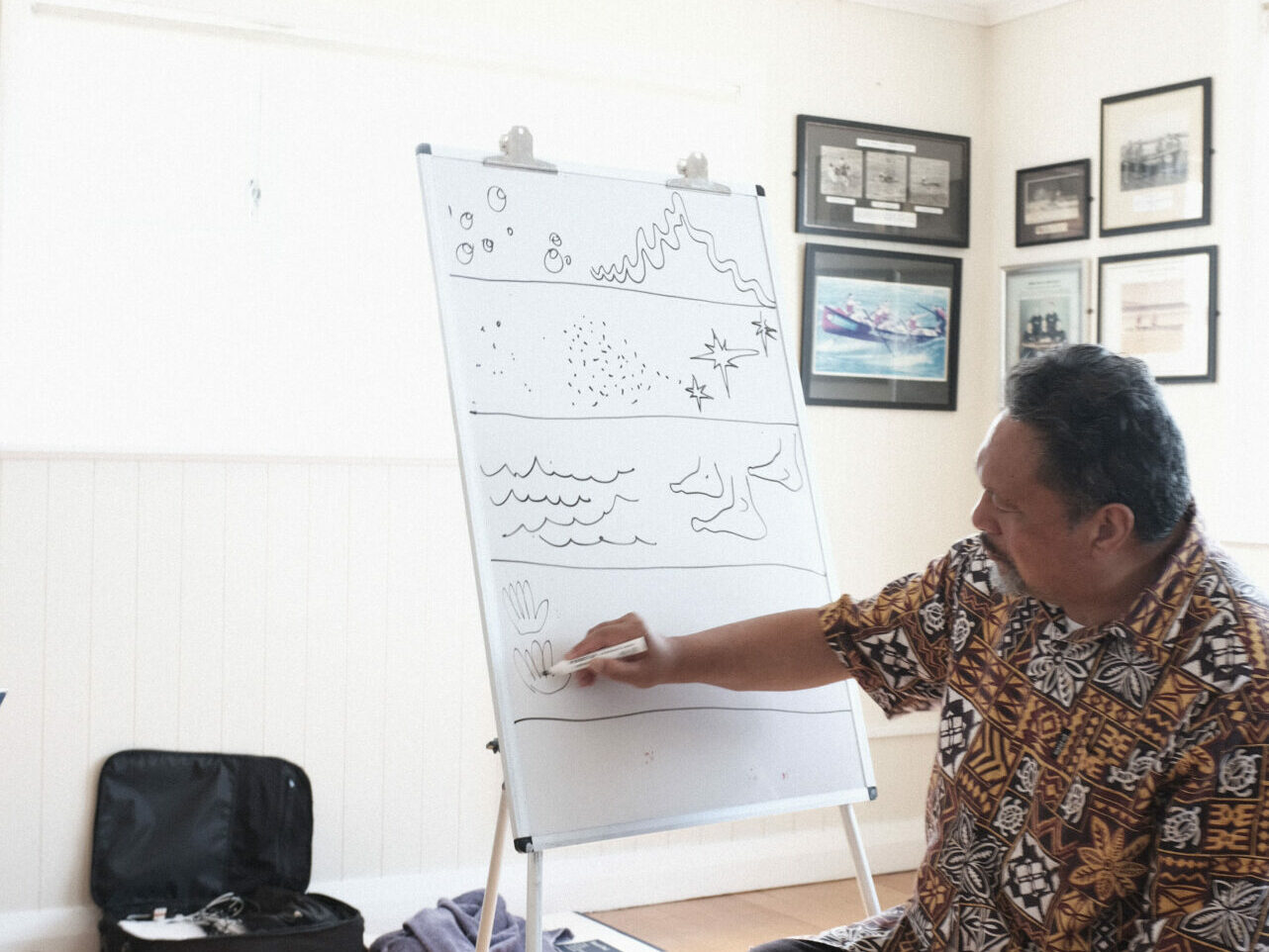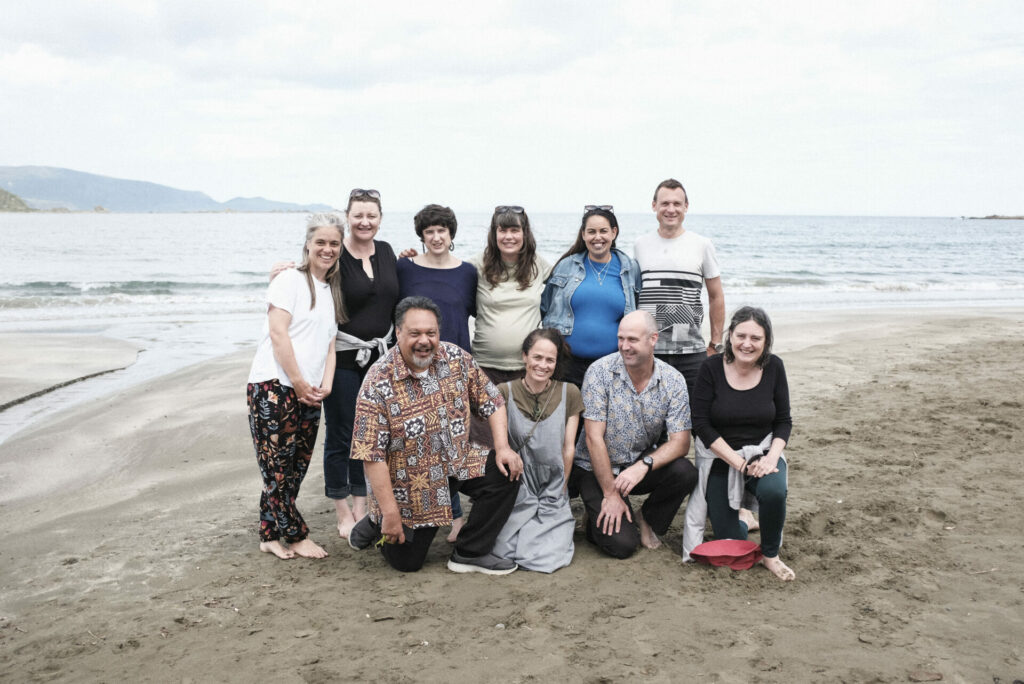We are all works in progress
We are all works in progress
In August 2022, Ruia Aperahama took on the role of Pou Tikanga for Te Kōmata o Te Tonga, the Deep South Challenge. Here he tells us a story, weaving together his background with the work he is supporting the Challenge to do.
Let me share a story with you…
It was a scorching 80’s summer day when our newlywed, fire-red-headed, pākeha sister-in-law took our baby nephew’s soiled disposable nappies out to the back of our house to a makeshift incinerator. She put them to flame. Our usually gentle father saw this and furiously charged out, growling sharply at her in Māori, frantically dowsing the fire with great irritation, then directed his frustration at our newlywed brother. With inconsolable tears she broke down not knowing what ‘crime’ or ‘offense’ she had just ignorantly committed.
At a family gathering many years later while reminiscing about those early years, I asked her while we enjoyed a steaming-hot, freshly earth cooked hāngī, if she remembered that harrowing nerve-wrecking moment and, more importantly, did our brother prudently explain to her why our father was so greatly upset. Our brother had failed to do so; conveniently dropping his fork with annoying haste he replied, “That’s the old ways! Dad was living in the past with his old superstitions and outdated ways! It’s a new world now. Progress.”
This is what our father shouted with enmity.
“Auē! Kei kino i a koe a Ranginui! Tō te whenua ki te whenua! Kei pau i te kāpura, me tanu kē! Auē taukiri e”!
“Oh no! Don’t harm sky father! What’s of the land must go back to the land! Don’t burn it, bury it! Oh dear, oh dear, oh dear!
Dad was raised in an isolated, far north, sole Māori speaking, close-knit fishing village, where every ecological sign, relationship and connection was observed, revered and utilized. Reciprocity. They always asked before they took from life, and returned something of equal value or more in return as the first offering. They were organically living off the grid way before it became fashionable. They could smell the subtle changes of temperature and tell how many days or hours it would be before it rained by the behavior of insects, birds, fish and animals. Many of them were illiterate by western standards yet were well versed in the ‘alphabet’ of seasonal life around them. Every evening our elders always sat in a huge circle like vigilant sentinels hugging the walls of our communal house, while the whole community, like a blazing fire in the centre, sat in the middle. They spoke about life through songs, symbols and metaphors with adoration, honour, celebration and respect, retelling of past generations activities and of ancient tribal histories. This way of living and more importantly their reverence for life and death has diminished over time, and in some instances has disappeared altogether.
They were organically living off the grid way before it became fashionable. They could smell the subtle changes of temperature and tell how many days or hours it would be before it rained by the behaviour of insects, birds, fish and animals.
I also grew up in Rātana Pā, a Māori pan tribal community founded on an indigenous religious and political movement inspired by 1920’s Māori prophet and healer, TW Rātana. He unassumingly but powerfully revolutionised Māori spiritual and political participation and engagement that revived Te Tiriti o Waitangi from out of NZ’s amnesia. My background also comes from 34 years of Education from new entrants to adult education, in mainstream and Māori medium pathways. I’m a devoted musician and visual artist, which are my real passions. I also value the ripple effect of influence.

When Covid-19 began permeating our global fabric of ‘normality’, impacting communication commerce and travel, I was invited to join Professor Sandy Morrison, Dr Darren King, Dr Shaun Awatere, Dr Naomi Simmonds on the Kāhui Māori Te Kōmata o Te Tonga – the Māori advisory team to the Deep South Challenge governance board. Then in July this year I was appointed as Pou Tikanga – providing cultural support to our amazing Te Taura and Te Aho teams alongside two super-mums; wordsmith artist and communicator Nadine Hura and Mana Wāhine grassroots mover and shaker Naomi Simmonds. As kakitakawaenga they are intra-relationship weavers among whānau hapū and iwi researchers and scientists. I really love working with Nadine and Naomi because they genuinely understand the value of clear modest support and careful gentle navigating of communications and relationships with quality cultural and spiritual experience and advice. Herein is my primary focus, commitment and responsibility.
Furthermore, I love working with the broader engagement and leadership team; Angela Halliday, Zoe Heine, Alexandra Keeble, Kate Turner, Carolyn O’Brien, Mark Webley, Maximillian Scott-Murray and Phil Wiles. At Pātaka Museum we workshopped from despair to hope using Edward De Bono’s six hats, landing on Kingi Tāwhiao’s (Second Māori King) symbolic hat of response to colonization through spiritual potential, hope, optimism and emotional resilience. At Māranui Surf Club in Wellington’s Lyall Bay, we explored appreciation through art, music, meditation and creativity to connect, empathise, relate and resonate with one another while subconsciously learning three karakia and a pao, or waiata, I had composed during my flight to Wellington that morning. While enjoying, contemplating, meditating and reflecting on the natural beach, sea and air, I also wanted to provide pragmatic activities to my ongoing support.

I feel privileged to share these cultural values with our engagement teams over the next two years. ‘Climate change’ is an intergenerational problem, and it requires intergenerational solutions. While seemingly steeped in fear, scarcity, hopelessness and despair, it can also be an opportunity to reawaken desire, hope, innovation, inspiration and creativity through communications, messaging and relationships with all of our research communities.
‘Climate change’ is an intergenerational problem, and it requires intergenerational solutions.
Finally, As sons and daughters of our not so perfect but progressive country we call ‘home’, there is much to improve on in so many spaces, yet much to be extremely grateful for. I am amazed at the collective heart, caliber, skills and experience of the Deep South Challenge Engagement Teams. I have great hope because of this.
So then…was my father superstitious and outdated in his old ways? I’ll leave that for you to decide. As for my brother and sister in law, they too have grown and changed their views over time. It seems we are all work in progress.
STORYTELLING
FOR CHANGE
The Deep South Challenge has always experimented with supporting or initiating different kinds of storytelling to drive climate adaptation. These long-form magazine features allow us to weave different research projects into new patterns, helping us to see our research in different ways.